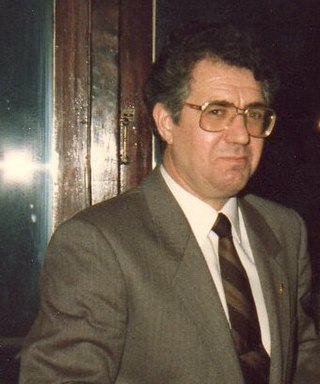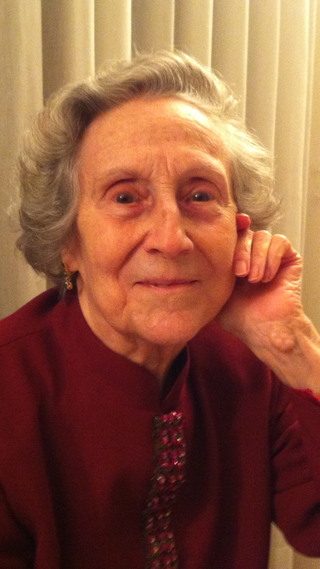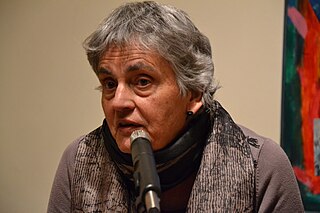
Olga Xirinacs Díaz is a Spanish writer and piano teacher. During her literary career, she has written poetry, drama, tales and essays. She was born in Tarragona, where she still lives and works.

Rosa María Sardà i Támaro was a Spanish actress. Her career in theater ranks her as one of the leading actresses of the Spanish scene.

Josep Maria Subirachs i Sitjar was a Spanish sculptor and painter of the late 20th century. His best known work is probably the Passion Facade of the basilica of the Sagrada Família in Barcelona. He was controversial, as he did not make any concessions to the style of the architect who designed the building, Antoni Gaudí.

Josep Lladonosa i Giró is a Catalan chef and food writer from the province of Lleida. He has been a chef since the 1980s. Throughout his career, he has also conducted extensive research on cooking techniques, products, recipes and the culture tied to eating in Catalonia. He has documented these aspects of Catalan cuisine since the Middle Ages, as exemplified in his book Llibre de Sent Soví. Lladonosa has diffused this knowledge through a large number of books and articles, some of which have been translated into languages including Spanish, English and French. He is also a famous gastronomy teacher, collaborating with individuals such as Joan Amades and Jaume Fàbrega. In 2003, he was awarded the highest Catalan honour by the Generalitat de Catalunya, the Creu de Sant Jordi.
Aurora Díaz-Plaja i Contestí was a Catalan writer and librarian. Born in Barcelona, Díaz-Plaja also worked as a critic, journalist, lecturer, and translator during her career. She was the sister of the writers Ferran Díaz-Plaja i Contestí and Guillem Díaz-Plaja i Contestí. Her published work included topics such as library management, as well as stories for small children, in both Catalan and Spanish.
Núria Albó i Corrons is a Spanish writer, teacher, and politician. She is a Creu de Sant Jordi and Premi Vila de'Arenys laureate.

Antònia Vicens i Picornell is a Majorcan writer in the Catalan language. She is a recipient of the Premi Sant Jordi de novel·la prize and the Premi d'Honor de les Lletres Catalanes.

Josefina Castellví Piulachs is a Spanish oceanographer, biologist and writer. Castellvi Peak on Hurd Peninsula, on Livingston Island in Antarctica is named in her honour. In 1984 she was the first Spaniard to participate in an international expedition to Antarctica. She received her bachelor's degree in 1957 and a PhD in biological sciences at the University of Barcelona in 1969. In 1960 she started working for the Institut de Ciències del Mar in Barcelona. In addition, she conducted research at the Spanish National Research Council (CSIC) and was a delegate in Catalonia for two years (1984-1986).

Jordi Puigneró Ferrer is a Catalan IT engineer and politician. He served as Vice President of Spanish Autonomous Community of Catalonia and Minister of Digital Policies and Territory since May 2021 until 29 September 2022. He previously served between 2018 and 2021 as minister of Digital Policies and Public Administration of the Government of Catalonia. He is a member of Together for Catalonia (JUNTS) political party. He is considered the designer and architecture of the Catalan Digital Republic project.

Eulàlia Lledó i Cunill is a doctor in Romance Philology from the University of Barcelona, a specialist in sexism and language research. She is the author of the first guide in Spain on the treatment of gender violence and media, published in 1999 by the Andalusian Women's Institute and Radio y Televisión de Andalucía. She has received several awards for her work, including the Creu de Sant Jordi in 2008. She is currently a contributor to HuffPost.

Rosa Maria Carrasco i Azemar was a Spanish politician from Catalonia, one of the founders of the Democrats of Catalonia party.

Montserrat Minobis i Puntonet was a Spanish feminist journalist.

Pepita Pardell Terrade was a Spanish animator, cartoonist, illustrator, and painter. She was a pioneer of animation cinema in Spain. In 1945, she worked on the first animated film, in color, in Europe. Pardell was awarded the Creu de Sant Jordi in 2018.
Maria Pilar Busquets i Medan was a Spanish Aranese politician and writer, 1st Síndic d'Aran between 1991 and 1993.

Margarida Aritzeta i Abad (Valls, July 20, 1953) is a writer and was a professor of literary theory and comparative literature at the University Rovira i Virgili (Tarragona) until September 2018.

Núria Feliu i Mestres was a Spanish Catalan singer and actress, a singular figure of the Nova Cançó movement.

María Dolores Juliano Corregido was an Argentine cultural and social anthropologist based in Spain.

Marta Pessarrodona y Artigues is a Catalan poet, storyteller and literary critic. She has also written essays and biographies. She is the author of books such as Primers dies de 1968 (1968), Setembre 30 (1969), Vida privada (1972), Memòria (1979), A favor meu, nostre (1981), Tria de poemes (1994), and L'amor a Barcelona (1998). In 1997, she received the Creu de Sant Jordi.

Jordi Porta i Ribalta was a Spanish cultural administrator and writer.
















